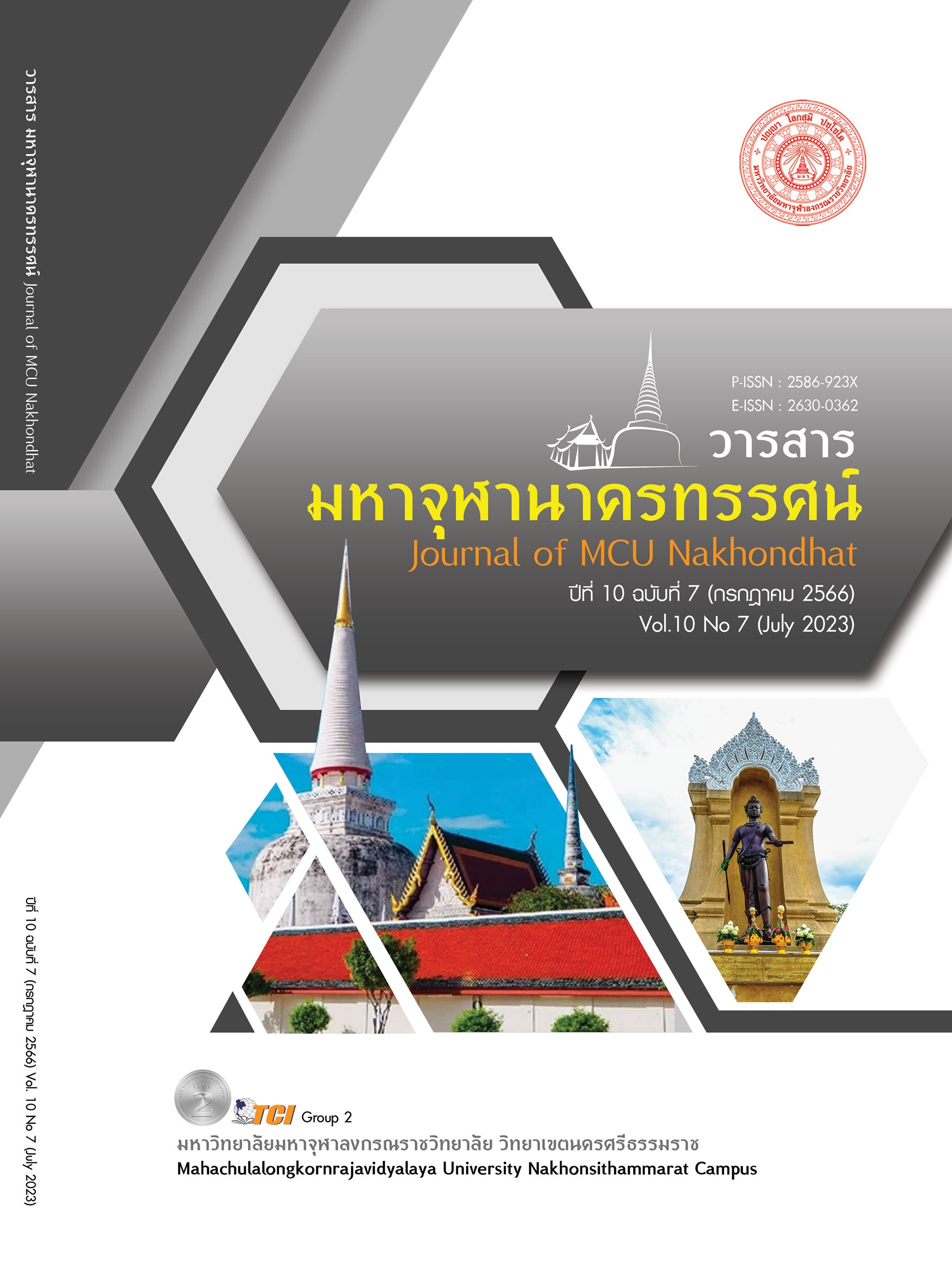A STUDY OF SPIRITUAL AND RELIGIOUS PROCESSES IN STRENGTHENING THE IMMUNE SYSTEM OF THE ELDERLY
Main Article Content
Abstract
The purpose of this research was to study the effects of the cognitive process model and religion, to strengthen immunity for the elderly using participatory action research methodology. The research was divided into 2 phases with 10 steps, 12 participants, 5 key informants, and the target group was 35 elderly people. The research tools were questionnaires, interviews, and focus group. The results of the study showed that the model of participation in the development of the elderly's performance by using the cognitive and religious process model to strengthen the elderly's immunity was also successful. Well, both how to design a group process, by using intellectual activities to drive the elderly group to have activities together by using temples and principles to guide life. The performance allows the elderly in the community to gather people of the same age group to make friends, socialize, and feel happy and peaceful in aging life due to the cultivation of mindfulness and concentration, and the principle of letting go, which is used as an important guideline for designing activities. It also found that participation must be caused by supporting factors in all aspects, including families, communities, and community leaders must seriously participate in concrete activities and learn together. The important driving mechanism that makes the activity successful. In terms of structure, there must be a leading teamwork or operation team and support team. In addition, the participation roles of houses, temples, schools, community leaders and/or local government organizations. It is very important to take part in creating activities to take care of the elderly in the community.
Article Details

This work is licensed under a Creative Commons Attribution-NonCommercial-NoDerivatives 4.0 International License.
References
จิราพร เกศพิชญวัฒนา. (2549). รายงานการวิจัยโครงการพฤฒิพลัง: กรณีศึกษาจากผู้สูงอายุที่ได้รับการยอมรับในสังคม. ใน รายงานการวิจัย. สำนักงานกองทุนสนับสนุนการสร้างเสริมสุขภาพ.
บรรลุ ศิริพานิช. (2542). ผู้สูงอายุไทยกับการศึกษาต่อเนื่อง. วารสารคณะกรรมการแห่งชาติว่าด้วยการศึกษาสหประชาชาติ, 31(1), 8 – 11.
เพ็ญแข ประจนปัจจนึก. (2550). รายงานวิจัยฉบับสมบูรณ์เรื่องการจัดการศึกษาและการเรียนรู้ตลอดชีวิตเพื่อเตรียมความพร้อมในการพัฒนาภาวะพฤฒิพลังในผู้สูงอายุไทย. ใน รายงานการวิจัย. สำนักงานกองทุนสนับสนุนการวิจัย.
สุทธิชัย จิตพันธุ์กุล. (2544). หลักสำคัญของเวชศาสตร์ผู้สูงอายุ. กรุงเทพมหานคร: โรงพิมพ์ จุฬาลงกรณ์มหาวิทยาลัย.
สุทธิชัย จิตะพันธ์กุล และคณะ. (2545). ผู้สูงอายุในประเทศไทย: รายงานการทบทวนองค์ความรู้ และสถานการณ์ในปัจจุบัน ตลอดจนข้อเสนอแนะทางนโยบายและการวิจัย. กรุงเทพมหานคร: ภาควิชาอายุรศาสตร์คณะแพทยศาสตร์ จุฬาลงกรณ์มหาวิทยาลัย.
สุมาลี สงข์ศรี. (2547). การพัฒนาชุมชนเมืองแห่งการเรียนรู้สำหรับสังคมไทย. กรุงเทพมหานคร: พริกหวานกราฟ-ฟิค.
อาชัญญา รัตนอุบล และคณะ. (2554). การศึกษาและการเรียนรู้ตลอดชีวิตของผู้สูงอายุไทย. กรุงเทพมหานคร: มูลนิธีสถาบันวิจัยและพัฒนาผู้สูงอายุไทย.
Lawlor, D., & Thomas, A. (2008). Residential design for aging in place. New Jersey: John Wiley & Sons.
Lowton, M. P. (1975). Planning and managing housing for older people. New York: John Wiley & Sons.
World Health Organization. (2007). Global age – friendly. Retrieved March 25, 2022, from https://www.jcafc.hk/uploads/docs/Global-Age-friendly-Cities-A-Guide-1.pdf


